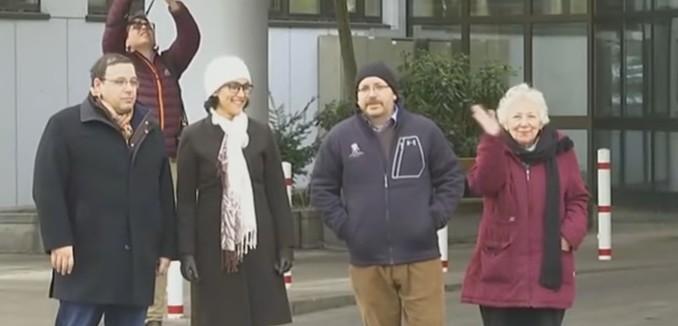A Washington Post reporter who was imprisoned by Iran for eighteen months filed a federal lawsuit against the country on Monday, saying he was taken hostage and tortured in order to “extort” concessions from the United States.
Jason Rezaian, who was arrested in July 22, 2014 and released with four other Americans on January 16, 2016 — the same day that Washington lifted nuclear-related sanctions against Iran — alleged in the suit that he was detained to give the Islamic Republic leverage over the U.S. during negotiations regarding Tehran’s nuclear program, the Post reported. “For nearly eighteen months, Iran held and terrorized Jason for the purpose of gaining negotiating leverage and ultimately exchanging him with the United States for something of value to Iran,” states the suit, which was filed in the U.S. District Court in the District of Columbia.
The U.S. flew $400 million in foreign currency to Iran on the same day that the American hostages were released, and subsequently flew two more payments worth $1.3 billion to Iran for a total of $1.7 billion.
Rezaian, who was arrested along with his wife Yeganeh Salehi, was informed by Iranian officials that he had “value” as a bargaining chip in negotiations with the U.S. and other world powers, the suit says. It also ties key events during the nuclear negotiations with Rezaian’s treatment in Iran’s judicial system, the Post wrote.
The suit was filed by Rezaian, his mother Mary, and his brother Ali under the “terrorism exception” to the Foreign Sovereign Immunities Act, and asks for an unspecified sum from Iran. The exception allows private citizens to sue state sponsors of terrorism in domestic courts “for terrorist acts, torture or hostage-taking by countries,” the Post explained. The Rezaians accuse Iran of all three.
Salehi, a native of Iran, was freed after 71 days when her brother-in-law Ali paid bail worth $71,000. Rezaian was reportedly convicted of espionage last October, though the trial was closed and there was no official account of his conviction.
The lawsuit describes previously unreported tactics used by Iranian officials in an effort to extract confessions from Rezaian and Salehi, who were each threatened with execution and dismemberment, and warned that their spouse or other family members could be subject to the same fate.
“For 544 days, Jason suffered such physical mistreatment and severe psychological abuse in Evin Prison that he will never be the same,” the filing states. “He will require specialized medical and other treatment for the rest of his life.”
Salehi’s treatment left her with skin lesions and hair so badly matted that she had to cut it off. When visiting her imprisoned husband after her release, she was forced to wear a prison uniform and told that she could be re-arrested.
These threats and doubts as to whether Jason would ever be released made both Salehi and Jason’s brother, Ali, consider suicide as a way of bringing greater attention to his plight.
The lawsuit (.pdf) also cited several Iranian officials and sources who asserted that the $1.7 billion payment by the U.S. was ransom for Rezaian and the other American hostages.
During a televised debate between President Rouhani’s cultural adviser, Hesam al-Din Ashna, and former President Mahmoud Ahmadinejad’s culture minister, Mohammad-Hossein Saffar Harandi, Harandi claimed that the United States paid $1.7 billion in exchange for the hostages—and, in particular, for Jason.
Iran’s Tasnim News Agency stated that “as Iranian and European officials were announcing the implementation of the nuclear deal, the release of the prisoners was taking place” and claimed that “$400 million was delivered to Iran in cash [on] Jan. 17 at Mehrabad airport.”
Javad Karim Ghodousi, a hardline member of Iran’s Parliament, stated that Iran “didn’t give up anything and got everything [in the negotiations]. We gave [up] Jason Rezaian—who/whose usefulness had been exhausted and would have only manifested a loss from then on—and in return we got four concessions. They included the release of seven Iranians from U.S. prisons and the release of $1.7 billion in frozen Iranian assets[.]”
The suit also mentioned a claim by Brig. Gen. Mohammad Reza Naqdi, commander of Iran’s Basij militia, who said in January that the $400 million payment “was returned for the freedom of the US spy and it was not related to the [nuclear] negotiations.”
Pastor Saeed Abedini, who was released along with Rezaian, said in an August interview that an Iranian official told him that the American hostages could not be freed until the Iranians received more information about “another plane.” The Obama administration sent Iran the $400 million cash payment in an unmarked cargo plane.
According to Iranian media reports, the $1.7 billion interest payment was earmarked to help boost Iran’s military spending by 90 percent for next year.
[Photo: CBSN / YouTube ]




